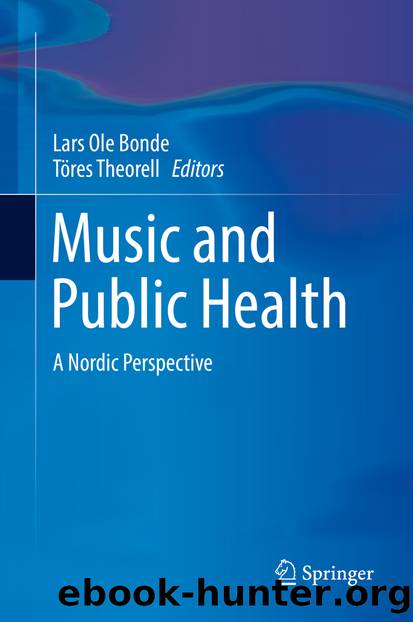Music and Public Health by Lars Ole Bonde & Töres Theorell

Author:Lars Ole Bonde & Töres Theorell
Language: eng
Format: epub
Publisher: Springer International Publishing, Cham
Partnerships for Health
In describing health musicking above, I clarified that participating agents sometimes form alliances in order to enhance their agency. In the public health literature, alliances that are characterized by trust, collective decision-making and dedication to shared goals are often labelled partnerships (World Health Organization 1998).
Causes that bring agents together are often complex and multifaceted, so that each partner realizes that collaboration across established lines of differentiation is helpful. Partnerships for health might involve agents in a range of sectors, working on various levels. An almost infinite diversity of goals and actions is imaginable (Amdam 2010).
Four types of partnerships that might be particularly relevant for music therapy are self-help partnerships, project partnerships, institutional partnerships and governance partnerships. Self-help partnerships for lifestyle changes and social change in a given context are collaborative relationships characterized by a democratic process of collective decision-making. Local and informal partnerships geared towards shared goals of say service development are often called project partnerships . Formalized collaboration between institutions is often called institutional partnerships , which are more judicially binding than project partnerships. In governance partnerships , public interests collaborate innovatively with private interests and/or the third sector (civil society) in order to realize shared policy goals (Stige and Aarø 2012, pp. 274–278).
Different types of partnerships are not mutually exclusive. A governance partnership , for instance, could stimulate self-help partnerships as well as project partnerships and institutional partnerships . Given the fact that public health work requires healthy public policy, governance partnerships are worth particular attention, and I will elaborate a little bit here upon this type of partnership.
In a study on governance for health in the twenty-first century, the World Health Organization (2012) examines various governance innovations, including joint action of various sectors in society and of public, private and civil society actors as well. Framed in this way, governance for health can be collaborative, similar to what Amdam (2010) calls governance partnerships where public authorities collaborate with a range of agents in order to realize shared goals. Governance partnerships or collaborative governance is often described as democratic, in that it is based on consensus-oriented decision-making, but the analysis performed by Ansell and Gash (2007) indicates that outcomes depend on critical variables such as prior history of conflict or cooperation, incentives for participation and power and resources imbalances. These authors also identify factors that are central in such collaborative processes, including face-to-face dialogue, trust building and the development of commitment and shared understanding.
Governance partnerships are, for instance, relevant as collaborative efforts for implementation of new knowledge, and for reorienting health services, in line with suggestions made in the Ottawa Charter (see above). Despite an increasing amount of primary and review studies in the field, it still remains uncertain how and under what conditions change strategies and interventions most effectively can be translated and exchanged to health professionals and integrated in their organizations (Pentland et al. 2011; Flodgren et al. 2011, 2012). Recent case and framework studies have been able to identify, however, that major factors
Download
This site does not store any files on its server. We only index and link to content provided by other sites. Please contact the content providers to delete copyright contents if any and email us, we'll remove relevant links or contents immediately.
When Breath Becomes Air by Paul Kalanithi(7264)
Why We Sleep: Unlocking the Power of Sleep and Dreams by Matthew Walker(5642)
Paper Towns by Green John(4169)
The Immortal Life of Henrietta Lacks by Rebecca Skloot(3826)
The Sports Rules Book by Human Kinetics(3588)
Dynamic Alignment Through Imagery by Eric Franklin(3489)
ACSM's Complete Guide to Fitness & Health by ACSM(3469)
Kaplan MCAT Organic Chemistry Review: Created for MCAT 2015 (Kaplan Test Prep) by Kaplan(3423)
Introduction to Kinesiology by Shirl J. Hoffman(3301)
Livewired by David Eagleman(3123)
The River of Consciousness by Oliver Sacks(2992)
Alchemy and Alchemists by C. J. S. Thompson(2912)
The Death of the Heart by Elizabeth Bowen(2901)
Descartes' Error by Antonio Damasio(2732)
Bad Pharma by Ben Goldacre(2730)
Kaplan MCAT Behavioral Sciences Review: Created for MCAT 2015 (Kaplan Test Prep) by Kaplan(2492)
The Gene: An Intimate History by Siddhartha Mukherjee(2491)
The Fate of Rome: Climate, Disease, and the End of an Empire (The Princeton History of the Ancient World) by Kyle Harper(2436)
The Emperor of All Maladies: A Biography of Cancer by Siddhartha Mukherjee(2431)
